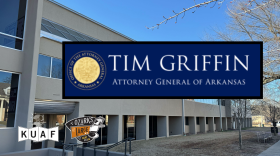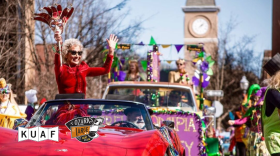Homelessness in Northwest Arkansas is on the rise. According to the annual point‐in‐time count from the University of Arkansas School of Social Work, 507 individuals were counted as experiencing homelessness on Jan. 30, up from 412 in 2024. Last month, New Beginnings NWA, a transitional housing organization in Fayetteville, held a 30-mile pilgrimage walk to raise awareness about the rise in homelessness in our region. Ozarks at Large’s Daniel Caruth has more.
On a brisk October afternoon, a small group huddled together on the north end of Walker Park in Fayetteville, dressed in raincoats, some with backpacks and walking sticks, as light rain drizzled. They are crowded around Solomon Burchfield, executive director of New Beginnings, a transitional housing facility for people struggling with homelessness.
“And so that’s really what we are walking for today, as we remember the names of people we’ve lost. Let’s remind ourselves that we are the ones who will be able to grab our community’s attention and use our voice, and use our resources and use our vote.”
The group is about to make the last mile of their nearly 30-mile pilgrimage from Bentonville to the New Beginnings headquarters in south Fayetteville.
“You know, it’s sometimes it’s just real easy to do nothing. You know, we see somebody on the street, we see somebody, and it’s kind of easy to look the other way,” said Jim Koski. He and his wife, Nancy, both participated in the three-day journey.
“What happened was, I was encouraged to take this walk. And I know there’s been a need at one time. At one time, I worked with the homeless. And that’s what kind of compelled me to come out. You know, I heard, like somebody said, we start off, I am a human being, and we forget that. And I learned. I also learned that a lot of these guys and men and women, they get sick, they go in, they go in the emergency room and they’ve had surgeries and they end up in a tent to recover. And you know, and that shouldn’t, shouldn’t happen in this country. You know, there should be some kind of housing for everybody.”
The group started their trek in Bentonville and followed the Razorback Greenway trail all the way to Fayetteville, camping out, stopping at community centers for food, and dodging rain and thunderstorms along the way. But as Nancy Koski says, their experience was only a taste of what those experiencing homelessness go through on a daily basis.
“For myself, just being with people that have experienced chronic homelessness and realizing they’re human beings and they are the people that we’ve met have been the most caring. They care for each other and they try and help each other. And I think we could learn a lot from them.”
Jenn Cole, who also joined the walk from Bentonville, says she believes projects like this are important to help people realize that homelessness is often closer than many people realize.
“A lot of people don’t realize that if you’re paying over 30% of your income, then you are just one paycheck away from being homeless or one car disaster or illness away from homelessness. So in my case, I was homeless because of a divorce. And so luckily for me, it was only nine months, which I say only nine months. That seemed like forever to me. But public housing was not in such a crisis back then. We’re like, well, the nationwide we have a huge crisis. But here we are very short on housing and affordable housing especially, so it’s almost nonexistent.”
Another pilgrim who joined the walk is Mark, a former New Beginnings resident. He says the most valuable part of his journey was being able to connect with and be heard by people who had not experienced homelessness.
“I love every one of them. They earned it. I’m so, so, so, so proud of him.”
Mark says he was in and out of homelessness for 32 years, until two years ago, when he spent 18 months at New Beginnings.
“This is my home. It’s not Fayetteville. It’s New Beginnings. They saved my life. That really, this place saved my life. I was jumping out in front of cars trying to end it. I tried to OD. It didn’t happen. I had a heart attack. I’m here for every one of my friends and family members that have died out here homeless. I got my energy from the ground. My friends and my family that have passed on. That’s what was motivating me. I don’t want to see another one of these people out here that are homeless go through what I did.”
As the walkers make their way up a gravel trail to New Beginnings, current residents and community members greet the pilgrims at the office’s front porch. Current resident Brie Grider holds a banner with the organization’s logo. She says there’s a lot of stigma that comes with being homeless, and wishes more people would make the effort to better understand what people go through.
“It’s hard. It’s hard to not have an address. It’s hard to not have somewhere to dry and safe to lay your head up. And you always have to watch. You know where you’re at and what you’re doing. You can catch more charges. You could get more trouble. It could cause a downward spiral. It’s just that so many of these people that are homeless are looked down upon because of whether they have a record or they’re disabled or they’re just, you know, they’re just making ends meet. And it’s so expensive in some places. You know what I mean? It’s just it’s difficult. And I don’t know, they just, need they just need, need the opportunity to expand and to work on this. And I hope that the, the community comes together to do this.”
In a field to the right of the New Beginnings campus, there’s a line of fold-out tables and chairs beneath strands of lights for a community meal. Before the group sits to eat, they mingle, and residents give people tours of the 20 small white cabins that dot the back pasture.
Solomon Burchfield stands at the front of the fence leading to the community garden. He says this pilgrimage walk coincides with New Beginnings’ fourth anniversary, and he wanted to do something different to commemorate that.
“Because a lot of times nonprofits do wonderful galas and golf tournaments and stuff, and that’s great. But I wanted to do something that could include the people who graduate from our programs and live in homes and kind of prove to all of us that people can and do recover from homelessness. How do I include those folks? They don’t golf. They walk. And so we kind of talked about, like, we could do a walk to build awareness and homeless folks maybe walk eight, 10 miles a day. And we thought that’d be a good way to a connect all the cities. So we don’t think this is a problem just in Fayetteville. This is Bentonville, Rogers, Springdale, Fayetteville, Siloam Springs. It’s a Northwest Arkansas problem. And so the Razorback Greenway is a cool symbol for how we connect all those cities.”
And Burchfield says while the walk may be over, there’s still a long way to go in addressing chronic homelessness.
“Empathy is not enough. It has to call us to action and make us think about the decisions we’re making as a community. How are we using our parks? Are we criminalizing homelessness? Are we making choices in where we invest our tax dollars to make sure to solve this problem? Or are we continuing the same old, same old where our tax dollars go to all kinds of amenities that kind of benefit everyone who’s already doing fine before we actually start addressing the places where the deep suffering is. I think about sometimes how a fire truck doesn’t stop at every house and check in on it when it’s on a call, like it goes to where the fire is. I think that homelessness is on fire in our community. Our neighbors who are on the street really are struggling, are suffering. And I think that before we do anything else, we need to figure out how do we use our shared resources to make affordable housing with the necessary supports available to everyone that really needs it?”
Ozarks at Large transcripts are created on a rush deadline. Copy editors utilize AI tools to review work. KUAF does not publish content created by AI. Please reach out to kuafinfo@uark.edu to report an issue. The audio version is the authoritative record of KUAF programming.








